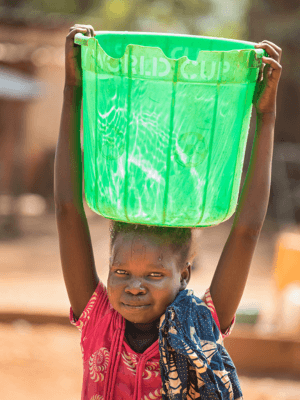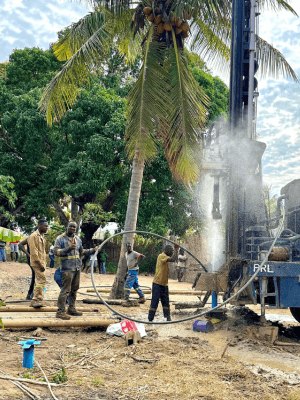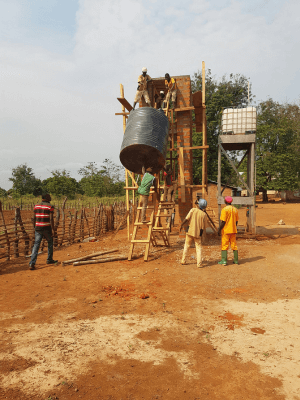World Water Day 2024: Cap Anamur Drills Drinking Water Wells
Although the supply of water is a basic human right, billions of people have no access to clean drinking water. Cap Anamur therefore ensures a reliable water supply in several projects on the African continent.
The human body can survive without food for up to several weeks.
Without water it is only 3 days. Water is the cornerstone, the foundation, the source of all life. Despite this, around 2 billion people worldwide have no access to clean drinking water. And 3.6 billion people do not have adequate sanitary facilities.
The consequences of this are not only death from thirst – diseases caused by germs and famine due to crop failures can also plague the population.
What is World Water Day?
The UN is therefore calling for World Water Day today – this year under the motto “Water for Peace”. The core messages here are:
- Water can create peace or cause conflict
- Prosperity and peace depend on water
- Water can lead us out of the crisis
How does Cap Anamur help with water supply?
Especially when Cap Anamur goes into war and crisis zones, a stable water supply is a pillar of our project management. Even the best-equipped clinic or the most beautifully renovated school is of little help to the population if their basic need for water is not guaranteed. The UN also likes to use the acronym WASH for “water, sanitation and hygiene”. As humans, we need clean and safe water every day. In addition to drinking water for human consumption, access to water is needed for other purposes such as personal hygiene, food preparation and washing, but also for agricultural use.

Infrastructure revitalization in Mozambique after fleeing from terror
Mozambique has been increasingly plagued by jihadist militias since 2017. Now that they have been repelled by the military in the north of the country, the displaced population has been able to slowly return to their villages. We have helped these villages to rebuild by building hospitals and health posts, among other things. But even without the oppression of terror, the inhabitants suffer from a harsh life. According to WHO estimates from 2022, only 63% have access to clean water. In underdeveloped, rural areas such as Cabo Delgado, the percentage will be even lower. Water pipes and a sewage system are rare. Cap Anamur was therefore also actively involved in the revitalization of the water infrastructure. Our project manager Michael Schlüssel reports on our progress on site:
“In Nacoba, Quissanga District, we drilled a well and installed a hand pump in 2023. It is the only well in the village that supplies water all year round and saves the majority of the population from having to walk several kilometers to the nearest water point outside the village. Accordingly, the completion of the well was well received by the population.”

In quite a few areas there are even existing boreholes of sufficient depth, but without functional hand or electric pumps, such as Miteda in the Muidumbe district. In such cases, it is enough to install the appropriate equipment or repair defective pumps to supply the entire village with water. We are also planning to install rain gutters on the health center buildings in order to establish an additional water supply.
Drilling is currently still taking place on the grounds of the hospital in Pemba, albeit with technical problems. We remain optimistic that success will soon be achieved here, too, and that we will find water to which we can connect a pump and a cistern.
Drinking water and hygiene supplies for our hospital in Central Africa
We have been on the ground in the Central African Republic since 2013 to set up and operate the hospitals in Yaloké and Bossembélé. In this country, too, there are repeated armed conflicts due to a civil war and the general infrastructure is catastrophic, including the water supply. Our local project coordinator, Marius Akpe, reports on his successes:
“In 2022, a well was drilled in the hospital in Yaloké, which we also operate, and a water tower was installed, into which the water is pumped up by an electric water pump so that it can then be distributed in the hospital via pipes.”

“We have also built new toilets in Yaloké with a different approach, as the ones from 2014 are ‘full’. We have installed separate showers and toilets here. The outhouses have now been completed. We are now planning to renovate the showers from the ruins of the outdated toilets, which are all blocked and overflowing. We should be able to fill the overflowing pits with topsoil in the first instance. We will dig new pits and the drainage water will be diverted from the existing toilet infrastructure. The holes in the outhouse will be bricked up and the floor tiled. This will be turned into patient showers.”
In addition to the health facility in Yaloké, we also run the district hospital in Bossembélé. In addition to a water tower on the grounds, which is used to supply the hospital with water thanks to the direct connection to the water pipes, there is also a well that is used by patients. This is because relatives – especially patients’ children – are often also in hospital with them and they have to take care of themselves while they are with us. Under these precarious conditions, we supply around 130,000 people living in the region.

